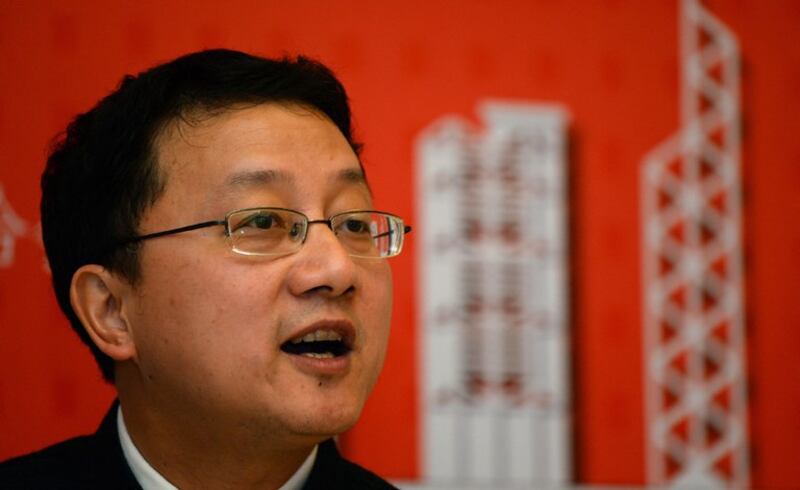Bangladesh should reject a “cold war mentality and bloc politics,” China told Dhaka’s ambassador this week as it criticized Washington’s policy to contain Beijing that U.S. Secretary of State Antony Blinken outlined in a speech last week.
This was China's second apparent warning to Bangladesh in a little over a year. In May 2021, China's envoy to Dhaka said that bilateral ties could be "substantially damaged" if the South Asian country joined the four-nation U.S.-led Quad grouping, although there had been no sign of Dhaka wanting to join it or be invited. China's warning at that time provoked an unusually strong rebuke from Bangladeshi Foreign Minister A.K. Abdul Momen.
This time, the Chinese admonition was saltier, and it came via a foreign ministry statement issued about a Wednesday meeting between senior Chinese foreign ministry official Liu Jinsong and Bangladesh’s envoy in Beijing, Mahbub uz Zaman.
“The logic behind the U.S. Indo-Pacific strategy, AUKUS, the Quad grouping and the latest Indo-Pacific Economic Framework is U.S. ‘centrism’ and ‘exceptionalism,’ the Chinese Ministry of Foreign Affairs said in a statement issued Thursday.
“As a Bangladeshi proverb puts it, ‘a cock is bold on his own dunghill.’ As a result, it will only bring disgrace to itself, and at the same time undermine the regional cooperation framework and create bloc confrontation.”
Liu Jinsong (pictured below) serves as director-general of the Asian Affairs department at the ministry.
“China believes that countries in the region, including Bangladesh, will bear in mind the fundamental interests of their own countries and the region, uphold independence, reject the Cold War mentality and bloc politics, safeguard true multilateralism and defend the hard-won environment for peace and development in the region,” the statement went on to say.
The proverb cited in the press statement is, in fact, an old English one: “Every cock will crow upon his own dunghill.” According to The Oxford Dictionary of Proverbs, it means everyone is confident when on home ground.

The Quad, or the Quadrilateral Security Dialogue on the Indo-Pacific region, comprises the U.S., Japan, Australia and China’s arch-rival, India. AUKUS is a security pact under which Washington and London will help Canberra build nuclear-powered submarines using advanced technology.
And the Indo-Pacific Economic Framework is the bulwark of Washington’s economic strategy in the region that was unveiled last month with an initial membership of a dozen countries, including seven ASEAN members and other Indo-Pacific powers.
Blinken cited these and Washington’s involvement in other groups as “aimed at defending and, as necessary, reforming the rules-based order that should benefit all nations.”
Throughout his speech Blinken stressed Washington’s respect for nations’ sovereignty and respect for international rules, both of which China has continually breached, in the disputed South China Sea and at its borders with nations such as India.
“[W]e we want to strengthen a system in which as many countries as possible can come together to cooperate effectively, resolve differences peacefully, write their own futures as sovereign equals,” Blinken said in his speech at George Washington University in Washington on May 26, in which he laid out the Biden administration’s strategy for countering China’s global influence.
“The United States shares the vision that countries and people across the region hold: one of a free and open Indo-Pacific where rules are developed transparently and applied fairly; where countries are free to make their own sovereign decisions; where goods, ideas, and people flow freely across land, sky, cyberspace, the open seas, and governance is responsive to the people.”
All of these U.S. initiatives have drawn Beijing’s ire.
‘Not concerned with what China says’
Meanwhile, Bangladesh’s diplomatic circles aren’t happy either with China’s warnings.
Faruk Khan, chairman of the Parliamentary Standing Committee on the Ministry of Foreign Affairs, said Bangladesh would decide its courses of action independently.
“We are not concerned with what China says or America says about our position; we will take decisions independently in line with our foreign policy of prioritizing national interests and peace,” he told BenarNews on Friday.
“Our basic foreign policy principle is friendship to all malice to none. Bangladesh keeps herself aloof from all sorts of military alliances.”
Former foreign secretary Shamsher Mobin Chowdhury described China’s statement as inappropriate.
“This is completely a Chinese statement, not a joint statement. In this statement, China has made her position on Quad, Indo-Pacific alliance, AUKUS and the Indo-Pacific Economic Framework clear. And I think the statement does not reflect Bangladesh’s position,” he told BenarNews.
“In diplomacy, discussions on a third country come up at bilateral meetings. But the issues are never revealed in public, and these should not come in the public domain,” he said.
Munshi Fayaz Ahmad, a former Bangladesh ambassador to China, said China’s statement was intended as a message to all of the region’s countries.
“China thinks the U.S. and the western countries have been trying to engage many countries against China. They think so after the latest [U.S.] announcement of the China strategy,” he said.
“Actually, we need both the U.S. and China for our own interests. I think Bangladesh can join the Belt and Road Initiative and the Indo-Pacific Economic Framework for her own interests.”
BenarNews is an RFA-affiliated online news service.
